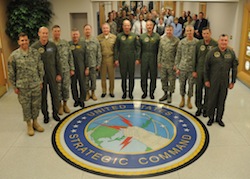Defense Officials: New START Does Not Constrain U.S. Missile Defense Plans
June 17, 2010
Featured Image
Today's top nuclear policy stories, with excerpts in bullet form.
Stories we're following today, Thursday, June 17, 2010:
U.S. Missile Defense Chief: START Won't Limit Plans - Reuters [link]
- Winning over Republicans who are among the most stalwart supporters of U.S. missile defense programs is critical to getting Senate approval of the new START treaty.
- "There are no limitations in the treaty that affect our plans for developing missile defense," Lieutenant General Patrick O'Reilly, director of the Missile Defense Agency, told the Senate Foreign Relations Committee.
- [Republicans] have pointed to a clause in the New START Treaty that prohibits the conversion of long-range missile launchers into missile defense launchers.
- O'Reilly replied that the clause was nothing to worry about because the actions it prohibits were not planned anyway. Officials had learned it is cheaper to build launchers, and easier to maintain them, than converting old ones.
- O'Reilly's appearance with two other Pentagon officials came a day after the treaty's chief U.S. negotiator told lawmakers that there were no secret deals to limit missile defense made with Moscow during talks on the pact.
The Way Forward on Missile Defense - Michele Flournoy and Ashton B. Carter in The Wall Street Journal [link]
- To counter Iran's ballistic missile program, President Obama announced a phased adaptive approach for European missile defense last September—a move unanimously welcomed by our NATO allies.
- In a departure from past approaches, we are no longer building systems anchored in one place and wedded to current threat assessments.
- We know that the capabilities of potential adversaries do not always progress according to intelligence assessments.
- Missile defenses have become a topic of some discussion in the context of the Senate's consideration of the New START Treaty with Russia. The fact is that the treaty does not constrain the U.S. from testing, developing and deploying missile defenses.
It's A Mad, MAD World - All Things Nuclear Blog [link]
- In the June 15, 2010 Senate Foreign Relations Committee hearing on the New START agreement, Senator DeMint (R-SC) again lamented that, as he argued, the United States has ruled out attempting to develop a missile defense system that could defend against a full-scale Russian nuclear attack.
- As Secretary Gates previously reminded Sen. DeMint, not since the early days of President Reagan’s Strategic Defense Initiative has any U.S administration sought to unilaterally neutralize Russia’s offensive capabilities.
- Russia wouldn’t simply accept this development. It could not accept the loss of its nuclear deterrent, and has a number of options to counter such a U.S. initiative.
- What could Russia do? It could substantially increase its nuclear arsenal, deploying additional missiles and warheads to overwhelm the defense or deploy nuclear warheads on cruise missiles, short-range missiles launched from ships, depressed trajectory submarine-launched missiles with short flight times, or any number of other alternatives to overwhelm, defeat, or go around a U.S. long-range, anti-missile system.
- Even Ronald Reagan in the end understood that seeking such a unilateral defense was hopeless.
There's No One Under the Bus - Foreign Policy [link]
- Critics of the Obama administration's "reset" with Russia have created a narrative that they repeat with striking consistency. In order to garner concessions from the Kremlin, they claim the administration has "neglect[ed] and even abandon[ed] other countries in region."
- The omnipresence of this narrative is matched by its complete disconnect from reality.
- most officials in these countries have become significantly less worried about the reset with Russia in the last six months. [Our allies in Eastern Europe] have also grasped something that the reset-bashers haven't: There have been no grand bargains or quid pro quos with Moscow that affect their relations with the United States.
- To address practically all the significant global challenges the country faces, from Afghanistan to nuclear proliferation to climate change, a functioning relationship with Russia is crucial. But thanks to the reset-bashers, maintaining such a relationship is becoming a political liability, even at a time when it is providing crucial security benefits.
A View from the Artsy Side
Countdown to a Nuclear Arms-Free World - The Nantucket Film Festival [link]
- Countdown to Zero, directed by Lucy Walker, is a shocking documentary that asks the terrifying question "What if"? What if there was a major nuclear event on a major city and the repercussions for the rest of the world?
- Complete with stock footage from the 1950s, Walker expertly shows the vulnerbility of major cities across the world to atomic weapons and concludes that a complete worldwide disarmament is the only thing that can assuage fears of nuclear ruin.
- Countdown to Zero plays at The Nantucket Film Festival on Saturday, June 19th at 8:00 p.m at Coffin School.
- Live in the area and interested in seeing Countdown to Zero at the festival? Purchase tickets here.



